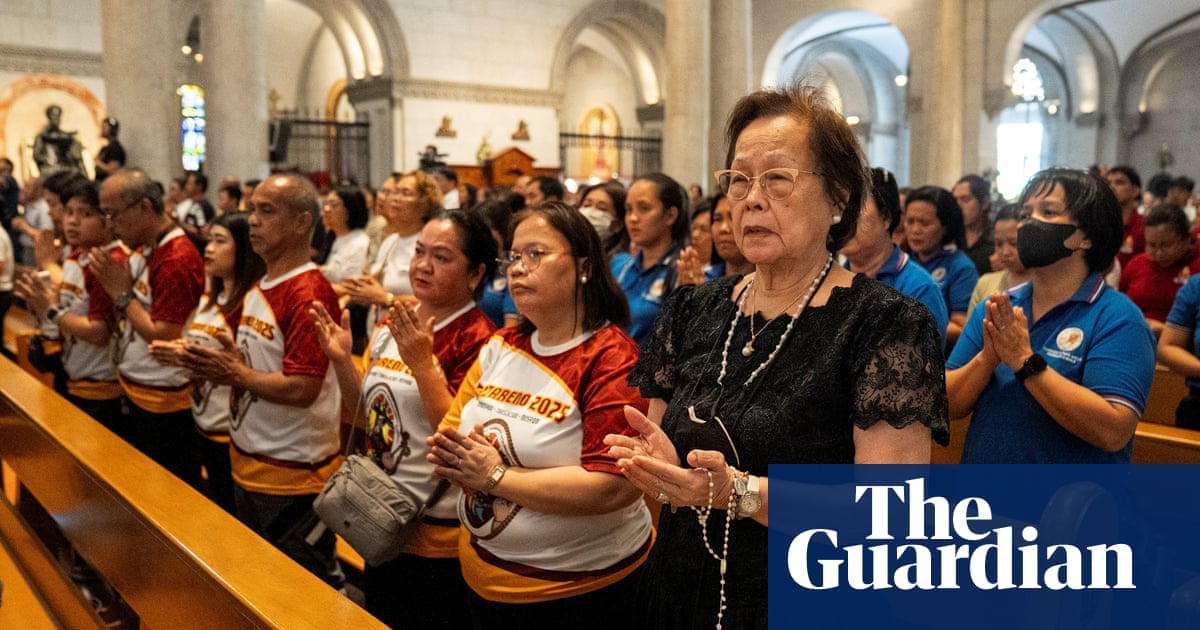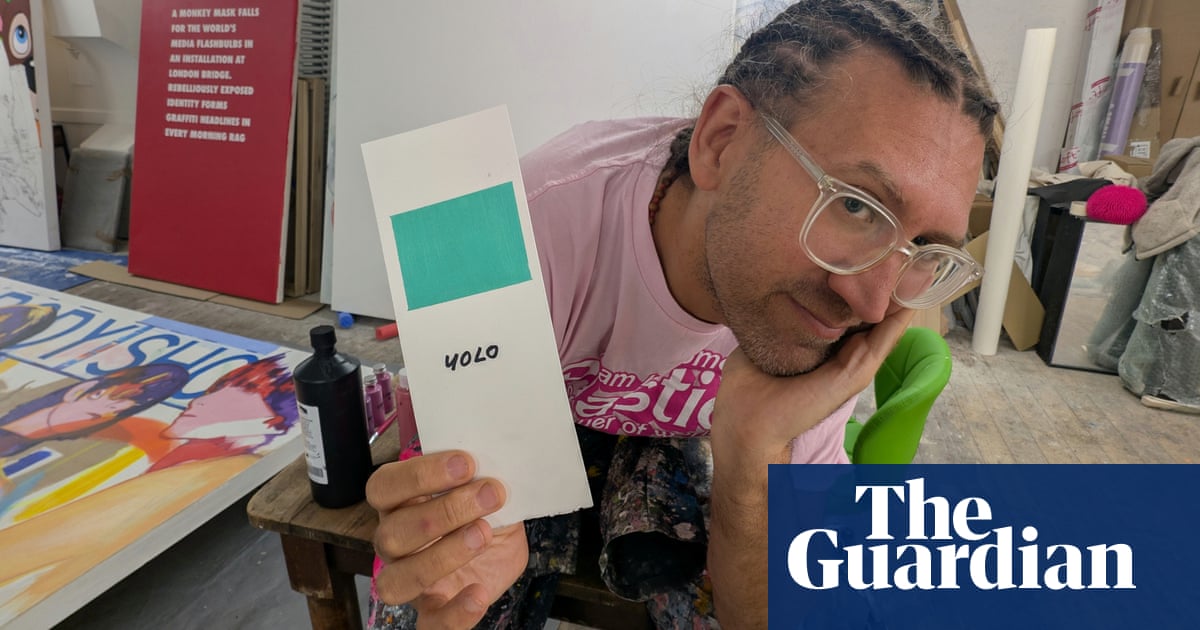As wildfires swept through southern Oregon in 2020, killing at least 11 people, destroying thousands of homes and burning more than 1m acres of land, the region’s farm workers faced a brutal choice: stay and work through the growing haze of smoke and the approaching blaze, or lose out on their daily wages.
Farm workers across the US are on the frontlines of the climate crisis, feeling its effects – from natural disasters to heat – first and, often, the worst.
So in the aftermath of the Almeda fires, which now rank as the most destructive in Oregon’s history, a local non-profit called Rogue Food Unites set out to help farm workers on two fronts. After initially providing hot meals and food boxes to survivors of the disaster, the group now hosts a weekly farmers market that offers free eggs, fruits and vegetables to those who are still facing food insecurity as recovery stretches on – with no questions asked about income or immigration status.
The market not only allows residents to get healthy food at no cost, but by purchasing local produce, Rogue Food Unites is also supporting the small, independently owned farms that have been working to rebound after the pandemic and wildfires.
“The intention is to welcome all families,” said Jesus Rios, the client liaison manager at Rogue Food Unites, noting that many of the families they serve are farm workers and other seasonal workers, many of whom are undocumented. “It’s open to anybody.”
Even before the fires, southern Oregon was facing an affordable housing crisis. In the city of Medford, more than half of all renters were cost-burdened, meaning they paid more than one-third of their income on housing. Now, people’s budgets are becoming even tighter as rents increased post-disaster.
“Usually, toward the end of the month at the market, we hear families saying, ‘We’re really grateful for this food because we don’t have any more money left for groceries,’” Rios said.
The Rogue Food Unites farmers market doesn’t just help farm worker families.
Maria, an undocumented restaurant worker who asked that her full name not be used due to immigration concerns, lost 14 years of hard work almost overnight during the Almeda fires – her family’s home, their car and most of their belongings. In the four years since, in their efforts to rebuild, they have also wiped out most of their savings, Maria says through an interpreter.
Maria and her husband both work in restaurants in the sparsely populated region in southern Oregon called Rogue Valley. Already hit hard by the Covid-19 pandemic, which had left them both with fewer hours at work, the family has struggled to rebound. “We need to work three times as much,” she said. “The cost of everything – rent, food – is so much higher.”
To offset the inflated cost of living since the wildfires, Maria has relied on the farmers market, where she can receive food staples for free.
Farm workers in southern Oregon consistently say that the cost of housing is their biggest issue, according to Reyna Lopez, the director of Pineros y Campesinos Unidos del Noroeste (PCUN), a statewide farm workers union, says farm workers in southern Oregon are often squeezed by the cost of housing and other essentials. “Within our membership, at least a quarter of folks say they have gone to a food bank over the last year,” she said.
The average farm worker’s take-home pay in the state is below $25,000 a year, according to state data. “It’s pretty devastating that the same population that ensures America is being fed, that a big chunk of them are food insecure,” Lopez said. “And it’s no secret that a majority of that workforce is from Mexico or Latin America.”
Yet many of these families aren’t able to access federal assistance, like the Supplementary Nutrition Access Program (Snap), to help buy groceries every month. At least 1.2 million low-income immigrants across the US, including legal permanent residents, are shut out of this essential food aid program due to immigration status.
“Immigration status is connected to everything,” Lopez said. “There’s so many doors that are shut for you, like Snap benefits, healthcare services, social security benefits – even if you have worked there your entire life.”
But activists are pushing for change.
In 2023, PCUN and a coalition of food justice and immigration justice organizations backed a bill in the Oregon legislature called “Food for All Oregonians”. The bill would set aside state funding for a Snap-like program for Oregonians who can’t access federal benefits due to their immigration status.
“The basic premise is that if you’re human, you deserve food,” said Susannah Morgan, the president of the Oregon Food Bank, one of the largest organizations involved in the coalition. “Immigrants and refugees – our neighbors, co-workers, friends – experience some of the highest rates of hunger in our state. It’s unacceptable that federal policies continue to exclude our communities.”
Though the bill didn’t pass in the 2023 session, advocates plan to reintroduce it this year.
More than 60,000 people in Oregon could benefit from the expanded benefits, at a cost of $120m every two years, Morgan says. As proposed, the program would allow people to use the same applications for state or federal food assistance; applicants who are citizens would qualify for federal benefits, while those who are undocumented would qualify for the state-subsidized benefits instead.
“If we’re able to ease the eligibility requirements and streamline the application process, many more families are going to be able to access these essential nutritional supports,” Lopez said.
In 2022, the coalition successfully pushed the legislature to pass a bill that expands overtime benefits to farm workers. And after the Almeda fires, PCUN pushed for stronger heat and smoke rules, protecting outdoor workers from unsafe conditions during climate disasters. In 2022, the state adopted the strongest protections in the country, mandating that employers provide access to shade, cold water and rest breaks during extreme conditions. This is all the more important in a changing climate.
“Having higher wages and making sure that people are able to live a better quality of life is really important when it comes to food justice,” Lopez said. “Financial insecurity leads people to rely on less nutritional food – or maybe people just go without eating, because the fear of deportation can prevent undocumented workers from seeking help.”
Now, as Donald Trump begins his second term, observers fear that the new administration will target these already inadequate safety nets.
“We are not trying to take advantage [of benefits programs],” said Maria, the restaurant worker from the Rogue Valley. “But life is hard. The government should think about that – our children suffer the consequences of hunger the most. If there is money available, people shouldn’t go hungry.”
This story is part of an ongoing series of reporting on a just and climate-friendly food system produced in collaboration with the Guardian, Nexus Media News, Sentient and Yes! Magazine with funding from the Solutions Journalism Network, advisory support from Garrett Broad (Rowan University) and audience engagement through Project Drawdown’s Global Solutions Diary.

.png) 2 months ago
24
2 months ago
24













































